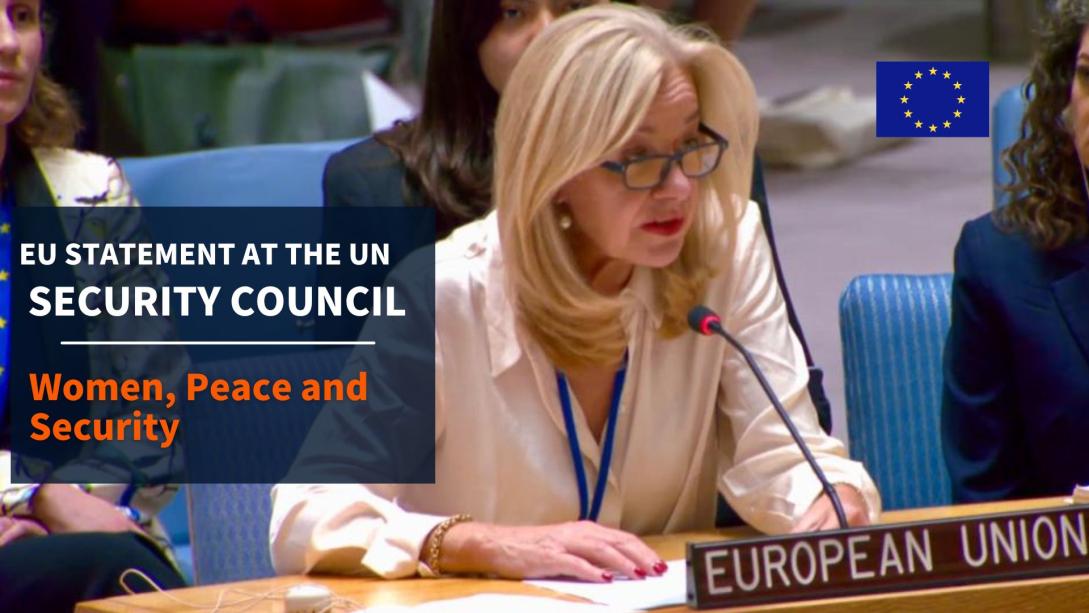EU Statement – UN Security Council: Open debate on Women, Peace and Security

- Check against delivery -
Mr. President, Excellences, Distinguished Participants, ladies and gentlemen,
I have the honor to speak on behalf of the European Union and its Member States.
The Candidate Countries, [1]Montenegro, 1Serbia, 1Albania, Ukraine, the Republic of Moldova and 1Bosnia and Herzegovina, the potential candidate country Georgia, as well as, Andorra, Monaco and San Marino align themselves with this statement.
The UN Security Council Resolution 1325 on Women, Peace, and Security driven by a global constituency of women’s civil society organisations together with a geographically diverse group of Member States reminds us that gender equality is a universal value. Resolution 1325 and subsequent Women, Peace, and Security resolutions remind us of our joint commitment to hold women’s rights and their leadership at the core of security and political decision-making.
More than ever, it is imperative to deliver on the principles outlined by the WPS agenda. The world faces alarming security and conflict shifts and geopolitical power competitions. Advanced technology and cyber warfare, as well as climate change redefine how we think about security. We have witnessed weaponization of energy, of food, of migration movements, and of information. There are attempts to weaken the rules-based multilateral order. Against this backdrop, women’s leadership and their full, equal and meaningful participation at all levels of decision-making is essential. Our commitment to mainstream gender perspective in responding effectively to these security threats is ever more important.
While the space for civil society is shrinking across the world, women and girls peacebuilders have continued to be at the forefront of peace-building efforts, playing a critical role in resolving conflicts, mediation, promoting reconciliation, and fostering stability in their communities and nations. Their contributions, often in the face of adversity, underscore the remarkable resilience and determination that characterize women peace builders and peacebuilder networks, and should be made use of in all tracks of peace processes.
In the scope of today’s discussion, allow me to highlight three concrete areas for further focus:
1. We should work resolutely towards sustained, predictable and flexible funding for women's and women-led organizations. Funding cuts and restrictions hinder their financial independence and operational capabilities and thereby slow down the effective implementation of the WPS agenda.
2. We need to act decisively to end and prevent all forms of violence, harassment, intimidation, threats and reprisals, online and offline, as well as the spread of disinformation designed to discredit and silence women politicians, human rights defenders, peacebuilders and civil society activists. That includes reprisals against women who engage with the UN, in particular with this Council.
3. We should take strong measures to ensure full, equal and meaningful participation and leadership of women in diverse situations and conditions in political, military and security structures, as well as in peace operations and missions. This must include transforming discriminatory structures and social norms that hinder women’s participation. We should also work hard to take away barriers to participation. The EU will apply a coordinated approach to risk mitigation and prevention of all forms of sexual and gender-based violence. The EU will ensure that responses are victim- and survivor-centered and trauma-sensitive, including by access to sexual and reproductive health care services, as well as mental health and psychological support.
Mr. President,
In the EU’s strategic approach to WPS, women’s participation is a cross cutting priority that together with gender mainstreaming reinforces the implementation of the entire WPS agenda. During the past three years, we have increased the share of women amongst international staff in civilian missions from 24% to 28%. We have pledged a substantial increase in funding, totalling €30 million, for the period of 2022-2027 to the EU Human Rights Defenders Mechanism, and we continue to make the voices of Afghan women of diverse backgrounds heard through the Afghan Women Leaders’ Forum.
In collaboration with others, the EU will continue to promote women’s leadership and participation in peace and security at all levels.
[1] North Macedonia, Montenegro, Serbia, Albania and Bosnia and Herzegovina continue to be part of the Stabilisation and Association Process
